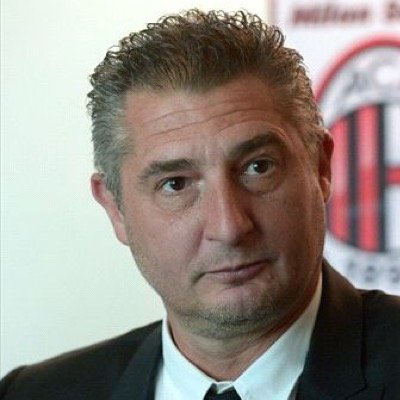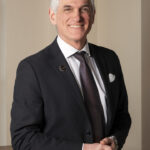
Daniele Massaro
Un campione che ha fatto la storia di un grande club
Massaro, nella sua vittoriosa carriera, qual è stata la caratteristica più apprezzata dagli allenatori che ha avuto?
Credo che la caparbietà sia stata sicuramente la mia caratteristica più importante. In verità, più che prescelto sono stato fortunato, grazie ad Adriano Galliani (padre sportivo) che ha creduto in me quando non ero nessuno, scoprendomi in un oratorio. Lui mi fece realizzare il sogno che avevo fin da bambino, indossare la maglia della mia squadra del cuore, il Milan. Sono nato tifoso di questa squadra e sono rimasto tale. Berlusconi quando comprò il Milan non mi conosceva, si fidò quindi di Galliani e mi acquistò. Credo di aver ripagato quella fiducia, dando al Milan il meglio di me e contribuendo ai numerosi successi ottenuti con quella magnifica squadra (10 anni).
Anche Arrigo Sacchi ha fatto parte della mia fortuna. Lui ha cambiato il mio modo di giocare; mi ha fatto crescere professionalmente insegnandomi il valore del gioco di squadra, prioritario sulle ambizioni personali. Credo che la mia caparbietà sia stata sicuramente la caratteristica più importante per determinare le scelte di chi mi ha allenato.
Ci racconta la sua esperienza in Giappone?
Negli ultimi anni della mia carriera era difficile fare la differenza al Milan. Fortunatamente ci sono riuscito ugualmente, convertendo la quantità in qualità nei pochi spazi che il mister mi riservava. Nel 1995, però, avevo capito di non riuscire più a fare la differenza e quindi, non volendo essere un peso per la mia squadra del cuore, decisi di smettere di giocare a calcio. Alla fine della stagione, tuttavia, mi si presentò l’offerta giapponese. Il Giappone stava organizzando la promozione dei mondiali di calcio nella loro nazione e per questo reclutavano campioni oltre confine. Fu la prima volta che feci una scelta di tipo economico ma mi portò fortuna, posto che in quel contesto, grazie all’esperienza maturata fino ad allora, riuscivo a fare ancora la differenza in campo. Questa parentesi mi portò a vivere un anno sabbatico in Australia per poi tornare in Italia quando, nel maggio del 1997, Adriano Galliani mi chiamò nel suo staff dirigenziale per continuare il rapporto con il Milan.

E il rally? Cosa c’entra? Anche in questo sport ti sei fatto notare, c’è una caratteristica che accomuna ambedue i successi?
Sicuramente sì. Io sono nato a Monza dove il tema della velocità è moto diffuso. Al di là del fatto che mi chiamavano “bip bip”, quando giocavo a calcio facevo 11 netti quindi ero tutt’altro che lento. Ma ciò che importa in questo contesto è il fatto che ho sempre giocato per vincere. Non sono un Decubertiano, posto che ho sempre giocato con la voglia di vincere, e per farlo ho sempre dato il massimo. Questo è il mood che spiega i miei successi. L’ho fatto nel calcio ma anche nel Rally, come nel tennis e nel Golf, altro sport che pratico con passione ancora oggi. Ho anche partecipato al Ferrari Challenge dove puoi correre senza perdere punti sulla patente.
Come mai molti giocatori, una volta terminata la carriera si dedicano al golf, oltretutto ottenendo ottimi risultati? Tu stesso sei un ambasciatore di questo sport, cosa ti piace?
Il golf è uno sport che ho conosciuto fin da ragazzo, quando abitavo di fronte a un campo da golf. Successivamente ho coinvolto anche i miei compagni di squadra del Milan. Da questo sport ho tratto sempre molti insegnamenti, due in particolare. Ho imparato a migliorare la concentrazione, oltre a trarre profitto dallo sviluppo delle pubbliche relazioni. Credo che questi due elementi rispondono efficacemente a questa domanda oltre al piacere di frequentare uno sport che ti consente di stare a contatto con la natura senza per questo subire particolari traumi fisici.
Il ritorno al Milan come nasce? C’entra il cuore?
In verità non ho mail lasciato il Milan; mi sono sempre sentito un membro di questa grande famiglia. Ecco perché, appena tornato dal Giappone, Galliani mi ha subito chiamato nel suo staff per gestire le pubbliche relazioni. Fu proprio lui a farmi capire, fin dall’inizio, di aver sempre avuto una naturale predisposizione verso questa attitudine.

Cosa ti ha portato ad avvicinarti alla politica? E’ una scelta che rifaresti?
Me lo chiese Silvio Berlusconi, una persona a cui devo tanto, non solo nell’ambito sportivo. Una persona molto generosa che mi ha permesso di indossare la maglia della mia squadra del cuore oltre a tenermi per 10 anni a San Siro. Quindi non potevo rifiutare quella richiesta. Se me lo richiedesse lo rifarei, sebbene debba confessare che il mondo della politica non l’ho ritenuto adatto alla mia personalità.
Noi siamo una rivista del Real Estate World. Quali sono state le tue esperienze con il settore immobiliare? Hai mai venduto o comprato una casa avvalendoti del contributo di un nostro collega? Come ti sei trovato? Ti affascina il nostro settore?
Il vostro mondo lo conosco benino. In tutte le mie esperienze legate a questo settore ho sempre trovato persone molto professionali, tranne rare eccezioni. Ho sempre apprezzato il lavoro di coloro che si pongono anzitutto come consulenti, orientati al bisogno del cliente senza dare per forza importanza alla vendita come obiettivo primario. La professionalità è sempre molto gradita.
Daniele Massaro
A champion who made the history of a great club
Daniele, in your career, full of trophies, what is the characteristic that made you chosen by the various coaches who were lucky enough to train you?
I believe that my stubbornness was certainly the most important characteristic to determine the choices of those who have coached me. In truth, more than chosen I was lucky, thanks to Adriano Galliani (sporting father) who believed in me when I was nobody, discovering me in an oratory. He made me realise the dream I had since I was a child, to wear the shirt of my favourite team, AC Milan. I was born a fan of this team and I’ve remained a fan. Berlusconi didn’t know me when he bought Milan, so he trusted Galliani and bought me. I think I have repaid that trust by giving Milan the best of me and contributing to the many successes achieved with that magnificent team (10 years).
Arrigo Sacchi was also part of my good fortune. He changed the way I play; he made me grow professionally by teaching me the value of teamwork over personal ambitions. I think my stubbornness was definitely the most important characteristic in determining the choices of those who coached me.
Tell us about your Japanese experience
In the last years of my career it was difficult to make a difference at AC Milan. Fortunately I managed to do it anyway, converting quantity into quality in the few spaces the coach gave me. In 1995, however, I realised I could no longer make a difference and so, not wanting to be a burden on my favourite team, I decided to stop playing football. At the end of the season, however, the Japanese offer came my way. Japan was organising the promotion of the World Cup in their country and they were recruiting champions from abroad. It was the first time I had made an economic decision, but it brought me good luck, because in that context, thanks to the experience I had gained up to that point, I could still make a difference on the pitch. This parenthesis led me to live a sabbatical year in Australia and then I came back to Italy when, in May 1997, Adriano Galliani called me in his management staff to continue the relationship with Milan.

What about the rally? What about it? You’ve made a name for yourself in this sport as well, is there a common feature of both successes?
There certainly is. I was born in Monza where the theme of speed is very widespread. Apart from the fact that they used to call me ‘bip bip’, when I played football I made 11 clean, so I was anything but slow. But what is important in this context is the fact that I have always played to win. I’m not a Decubertian, I’ve always played with the desire to win, and to do that I’ve always given my all. This is the mood that explains my successes. I’ve done it in football but also in rallying, as well as in tennis and golf, another sport I still play with passion today. I also took part in the Ferrari Challenge where you can race without losing points on your licence.
Why is it that so many players, once their careers are over, dedicate themselves to golf and achieve excellent results? You yourself are an ambassador for the sport, what do you like about it?
Golf is a sport that I have known since I was a boy, when I lived opposite a golf course. Later I also got involved with my Milan team-mates. I’ve always learnt a lot from this sport, two in particular. I have learnt to improve concentration, as well as benefiting from developing public relations. I think these two elements respond effectively to this question in addition to the pleasure of taking part in a sport that allows you to be in contact with nature without suffering any particular physical trauma.
How did the return to Milan come about? Does it have to do with the heart?
In truth, I have never left Milan; I have always felt like a member of this great family. That’s why, as soon as I came back from Japan, Galliani immediately called me onto his staff to manage public relations. He was the one who made me realise, right from the start, that I had always had a natural predisposition towards this attitude.

What brought you to politics? Is it a choice you would make again?
Silvio Berlusconi asked me to, a person to whom I owe so much, not only in the field of sport. A very generous person who allowed me to wear the shirt of my favourite team as well as keeping me at San Siro for 10 years. So I couldn’t refuse that request. If he asked me to do it again I would, although I must confess that I didn’t think the world of politics suited my personality.
We are a Real Estate World magazine. What have been your experiences with real estate? Have you ever sold or bought a house with the help of one of our colleagues? How did you get on? Are you fascinated by our sector?
I know your world quite well. In all my experiences in this sector I have always found very professional people, with very few exceptions. I have always appreciated the work of those who, first and foremost, act as consultants, oriented towards the customer’s needs without necessarily giving sales as their primary objective. Professionalism is always very welcome.





